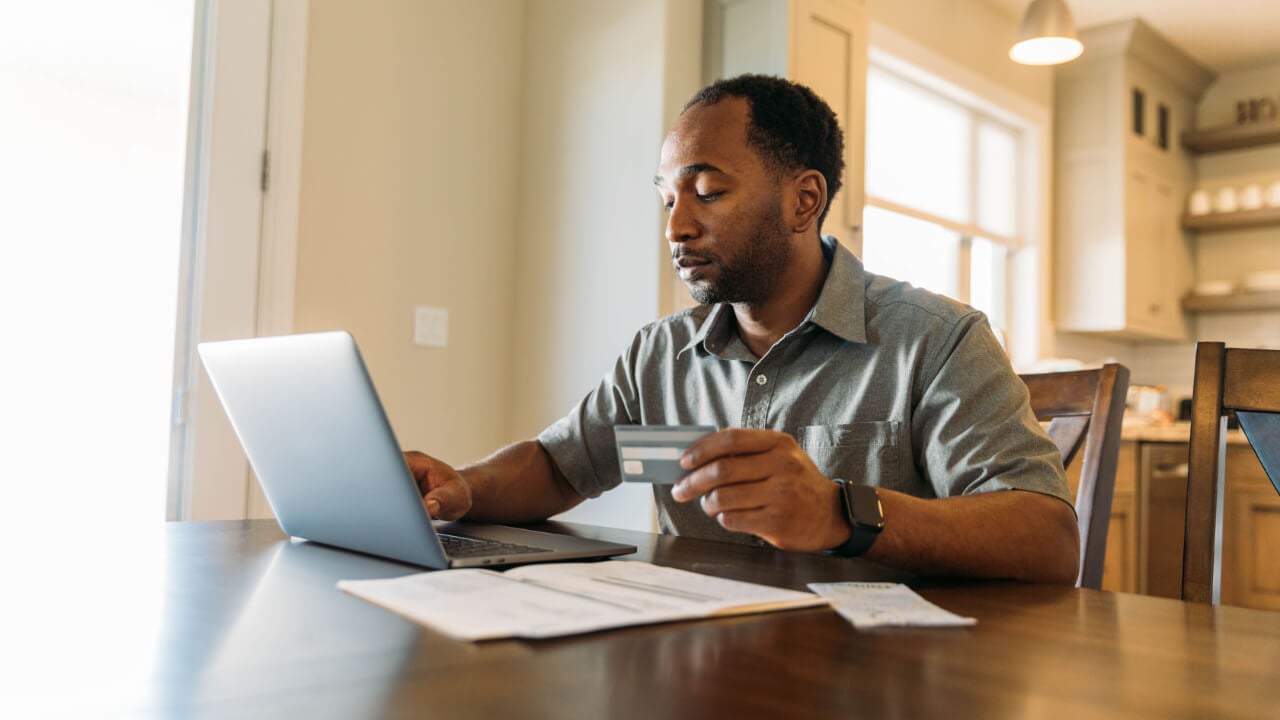Why you can still be on the hook for credit card charges you didn’t make… and how to avoid it

Key takeaways
- Although credit cards are one of the safest ways to pay, you may be stuck with unwanted purchases if you lend your card to family or friends — including children, authorized users and joint cardholders.
- You can dispute unauthorized charges through the issuer’s website or phone number on the back of your card. If the issuer sides with you, it may close your card, credit the purchases and send you a replacement card.
- You can prevent unauthorized and accidental charges by keeping your card and information secure, putting passwords or dual-factor authentication on your accounts and not saving your card in certain family accounts, if you can help it.
Imagine you connect a credit card to a game on your child’s phone for convenience. A few weeks later, you find out hundreds in charges were processed on your card in a matter of days.
Whether your child was unaware they authorized these charges while playing their game or their account was a target of fraud, you now have a huge credit card bill to contend with. Should you pay the bill or dispute it?
Believe it or not, this situation is incredibly common. In fact, a 2024 Consumer Financial Protection Bureau (CFPB) report spotlighted that there is a growing risk to young consumers due to the increasing role of financial activities in the gaming space. Almost one in four parents said their child had made an unauthorized purchase with their card, and a whopping $620 was the highest average amount spent without permission.
In some cases, it can be difficult to know whether a charge is unauthorized or “fraudulent,” or whether it’s your issue to deal with. Bankrate spoke to several credit experts to find out how consumers can tell the difference and how they can protect themselves.
What is an unauthorized charge?
Generally speaking, an unauthorized credit card charge is one you didn’t make that you don’t have any explanation for. Many times, unauthorized charges are discovered when someone is going over their credit card statements and notices charges they didn’t make. For example, you might see a purchase from a store you’ve never been to or notice repeated charges you don’t even recognize.
“In this case, someone has your account number and used it without authorization,” says Beverly Harzog, credit card expert and consumer finance analyst. This is why Harzog and other experts agree it’s a good idea for consumers to check their credit card statements often.
Most credit cards come with liability protection against situations just like that. This embedded protection against fraud is one of the biggest benefits of using credit in the first place.
When may you be responsible for charges you didn’t make?
There is still some gray area when it comes to unauthorized credit card use. Sometimes we trust a credit card to someone who isn’t honest or responsible with their use of it. What then?
Your spouse, friend or relative uses your credit card
According to Rod Griffin, senior director of consumer education for Experian, consumers who give someone permission to use their credit card are making an agreement between themselves and that person.
If the person uses the account for purchases you didn’t specifically approve, it’s between you and them to work it out, he says. “They were authorized to use the card under contract.”
In general, Griffin says, you should never let someone borrow your credit card because you’re risking this very scenario if you do. You’re taking responsibility for whatever they buy, whether you like their choices or not.
Credit expert John Ulzheimer, formerly of Equifax and FICO, says you’re ultimately responsible for your card’s use unless you contact the card issuer and claim charges were fraudulent. Even then, he says, the card issuer may not conclude they were fraudulent charges because you willingly let someone else use the account.
A child uses your credit card
What if your child uses your card without your knowledge or their own knowledge? A child using your card without you knowing is not the same as lending your card to a friend or family member who takes liberties. After all, you didn’t give them permission to use it. According to Griffin, this still doesn’t count as an unauthorized charge. When it comes down to it, you have legal responsibility for ensuring the card is not used by someone who shouldn’t have it.
“You are responsible for your child, not the bank,” Griffin says. “If they have the card and use it to make purchases as if it were you … whether you gave them permission or not … the charges are still valid under your contract with them.”
Even so, your lender may be willing to work with you and forgive the charges. “You can always ask,” says Griffin.
You don’t remember making a specific purchase
Naturally, just because you don’t remember a purchase you actually made doesn’t mean the issuer will let you off the hook. Forgetting doesn’t make it an unauthorized purchase.
However, you may be eligible for a chargeback if you ordered something there was an issue with your purchase — like if it didn’t arrive or did but not as described or your card was charged twice. A chargeback could be a valid option for legitimate cases in which you deserve money back from an uncooperative merchant.
Just remember that a chargeback is a last resort and is subject to the issuer’s discretion, so you shouldn’t use it simply because you forgot a purchase or changed your mind. This option could get your money back through the issuer but leave the merchant holding the bag, so be prepared to never shop with that merchant again if you’re intent on pursuing a chargeback.
How to dispute unauthorized charges on your credit card
Let’s say you add your credit information to one of your child’s games and a hacker is able to access your account information from there. Once they have your card details, they quickly rack up thousands of dollars in charges.
In this case, the purchases are absolutely unauthorized because you did not give permission and don’t even know where they came from. As a result, you can dispute the charges with your card issuer, which will launch an investigation. While the issuer checks out your claim, it will usually temporarily credit the charges back to your account.
The process for disputing charges is relatively easy. You can call your card issuer using the number on the back of your card. Some card issuers offer an online dispute process as well. Either way, be prepared to share information on the amount and date of the unauthorized charges, as well as any other details you have.
If the card issuer suspects thieves have their hands on your account number, it will likely shut down your original card and send you a new credit card with a new account number. If the investigation shows the charges were indeed fraudulent, you won’t be responsible for repayment.
Tips for avoiding unauthorized credit card use
The more you use your credit card or account number, the more you expose yourself to the potential for credit card fraud. Fortunately, credit cards are incredibly safe to use, with the vast majority offering zero liability for fraudulent purchases. At most, your liability for unauthorized use of your credit card tops out at $50, thanks to the Fair Credit Billing Act (FCBA).
However, it’s potentially more important to keep your card safe from friends and family who may make unintentional or unwanted purchases, since it may be harder to recover your money. For starters, be aware who is near when you use them and never expose the account number, PIN or security code. Don’t lend your credit card to other people you can’t wholeheartedly trust, and avoid saving your credit card information into digital accounts that your child or someone else may accidentally use.
Similarly, make any potential transactions with your child instead of handing them your card. Dual factor authentication, passwords and other security measures could also alert you whenever someone is trying to use your credit card.
Also, make sure you never leave credit cards or billing statements lying around where others can see them. Griffin points out that while fraud often starts with strangers, friends or family can also steal your account information and use it without your knowledge.
He also advises to be careful about who you decide to make an authorized user on your account, since you will be liable for repaying their charges no matter what those charges are. An authorized user comes into play when you actually request an authorized user card for another person to use your account. Not approving of charges made by an authorized user doesn’t make those charges fraud.
“Give careful thought before making anyone, including your children, authorized users on your accounts,” notes Griffin.
The bottom line
Credit card issuers offer zero liability protection to safeguard your account from being improperly used by strangers, but this generally doesn’t extend to family and friends. Unsurprisingly, the best rule of thumb for avoiding being on the hook for credit charges you didn’t make is to avoid letting other people borrow your credit card.
An issuer may be more forgiving if a child uses your card without your permission, but it’s best to use parental locks and prevent unsupervised access to your card information since you’ll likely be responsible for the charges. Similarly, simply “forgetting” you made a purchase won’t protect you from the consequences, either.
If you do need to give someone access to your credit card, make sure it’s someone you trust. Even then, be explicit about what purchases they’re allowed to make, get the card back as soon as possible and keep an eye on your account to review all the charges.
Why we ask for feedback Your feedback helps us improve our content and services. It takes less than a minute to complete.
Your responses are anonymous and will only be used for improving our website.









